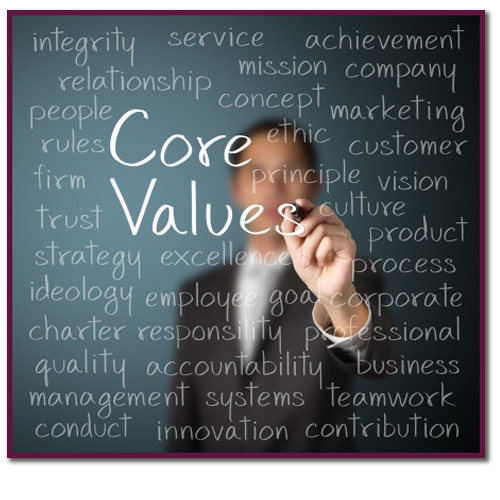Values Based Coaching
Applying for the “right” job can be tough. We often look at many of the overt goals when making our decision; how much we will make, the perks and benefits the job offers and what kind of workweek it gives us. Though these are important, we often don’t or are unable to identify the values that are truly important to us that would make our job experience a positive and successful one. You are probably innately aware of what you do well. Heck, you probably know you can learn and tackle pretty much anything that is put in front of you, right?

But do you really ENJOY what it is you are doing? People often confuse what they are capable of doing with what they really enjoy doing. Sure, we all have things in our work life that we have to do from time to time that we may not enjoy doing but are necessary. However, there is a distinct difference in doing those necessary evils once and a while and continuing to dislike what you are doing in your job over a period of months or years.
Companies often look for people who hold the same “values” as they do and uphold the company’s mission statement. But how do we know if these values are important to us? How can we be sure that the company actually upholds these values? And what does each value really mean for our company and our leaders?
Recognizing what is key to your happiness at work involves a deeper understanding of what is truly important to you, and your value system holds the key.
Understanding your values system helps you identify what you really need to be happy and productive in your job and to then be able to go into an interview making sure that you ask your potential employer the right questions to get these answers.
We often forget that though we are being interviewed for the job, it is equally important that we interview the company as well. Many of us assume that because we know about a great company through our research that they will automatically provide a great work experience for us. After all, we have all the credentials, fit the job description perfectly and hold all the right competencies, skills and strengths. Unfortunately, this isn’t always the case. When the “honeymoon” phase of a new job wears off and we begin to see in depth that many of our true values are not being met, we begin to feel discouraged and unhappy, which can lead to lower productivity and even burnout.

What a value means to one person may mean something completely different for another. Perhaps “dedication” to your work is a strong value for you. You define it as being present and productive during each hour of your 40-hour workweek, bringing new ideas to the table and meeting deadlines. You may become very disillusioned when your boss, who also holds the same value, defines “dedication” to your job as working 60+ hours per week, responding to e-mails sent at 2am and working an endless number of weekends. Until clarity is defined, you may end up feeling like you never live up to his/her expectations of you and feel like you are letting him/her down. Your boss may have even alluded to this fact in comments made to you. This results in you questioning your “fit” for the company, which could lead to confusion and disengagement.
I began to realize through the hundreds of interviews I have done over the years that though strengths and competencies were valued in a company, there was little to no focus put on what was really important to an employee based on their personal values system and how this impacted the kind and quality of work they did.
We all have different definitions of what each value means to us by our own definition. When there is a dramatic disconnect between definitions, expectations become blurred and incorrect assumptions are made between people, causing stress. When I began to focus more on what was really important to people based on their true values system, I could identify with clarity where they were on board and productive and where they were struggling.
Our values system is like our DNA. It is unique and does not always mesh with other people’s or a company’s values or mission statement. This is when disconnect happens. We begin to judge others and ourselves; unhappiness, disappointment and lower job productivity follows. Abraham Maslow called this innate self, the unchanging real self, which contains your natural dispositions, your preferred ways of perceiving, feeling, reasoning, deciding and participating in your society.

People often believe that not enjoying a job is normal. It is called “work” after all. Statistics would support this belief, considering that up to 70% of people are disengaged or hate their job. Unfortunately, they often go from job to job, hoping that the next one will be a better “fit”, without truly identifying the “why” behind it.
By identifying your core motivational drivers and innate core values, you will discover who you truly are as a person. Discovering these factors will allow you to more accurately choose jobs that let you be you, work successfully at your job naturally and provide overall job satisfaction, motivation and happiness, all while making your best contributions!
